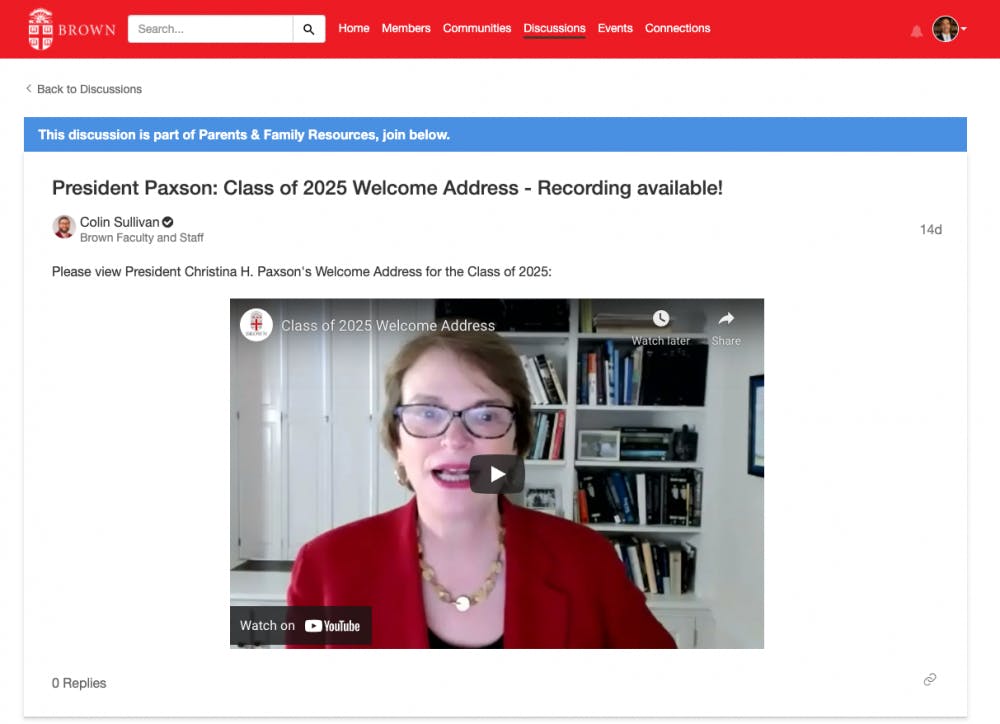As Tuesday’s deadline to commit to the class of 2025 nears, the University is utilizing a variety of online resources to convince admitted students to come to College Hill in the fall.
In years past, events for admitted students in the month of April — known in admissions as “yield programming” — mainly consisted of A Day on College Hill, when busloads of high school seniors descended on campus over the course of two days to sit in on classes and get a sense of the University.
Last year, ADOCH was one of the first events the University cancelled due to COVID-19 concerns. In its place, the Office of Admission quickly put together an online program on Wisr, a platform that allows prospective students to connect with current students, faculty and alumni.
This year, the University’s presence on Wisr — the “Bruniverse,” as dubbed by the Office of Admission — has scaled up. 3,321 users have signed on to the platform this year, the majority of which are prospective students and parents, while alumni, current students, faculty, staff and admission officers make up 441, according to numbers provided by the Office of Admission.
“Last year, it was a pretty quick transition to an all-virtual outreach program,” said Dean of Admission Logan Powell. “It was challenging to put together as many activities as we wanted to.”
With a year to plan out the admitted student programming for the class of 2025, the University has offerings “far more robust than any prior year,” Powell added. Ahead of this week’s May 3 decision deadline, admitted students will have had the chance to attend over 300 virtual events, sit in on Zoom classes and take virtual tours while engaging with a real tour guide.
The Bruniverse allows members to join a number of communities, where students and parents can ask questions, engage with current students, faculty and alumni and see announcements for events. The communities focus on everything from student resources such as financial aid and CAPS to student groups, life in Providence, specific disciplines and identity groups. Also new this year, Powell said, is a group dedicated exclusively to family members and parents.
Matthew Grinberg ’25, who was admitted in the regular decision pool, attended a virtual tour of Brown ESports’ model of College Hill on Minecraft.
“I do feel like I got a feel for where things are,” Grinberg said. “It almost felt like an actual tour.”
Grinberg also attended a Zoom hosted by the physics department — an “intimate setting” with five or six admitted students, a few professors and a handful of current physics students.
“It was really friendly and welcoming,” he added. “There was a lot of opportunity to explore.”
Anaya Kaul ’25, who was admitted early decision, said she didn’t attend many events, citing a busy schedule and at times, a lack of interest in the offerings on the Bruniverse sent out in daily emails. Still, she said she made it to a Zoom offered by the South Asian Students Association where current students detailed their experiences with the group.
Grinberg said he also thought the offerings some days were slimmer than he’d like — but added that the experience had still “blown away” his expectations.
This year “takes the concept we created last year and optimizes it for maximum interaction,” Powell said of the expanded offerings. “We know students, faculty and staff are busy. We rely on their enthusiasm and good will, and it was just an incredible outpouring of support. Almost everyone we reached out to was willing to drop everything to help us with this.”
The University also offered live Zooms with President Christina Paxson P’19, Provost Richard Locke P’18, Dean of the College Rashid Zia ’01 and Political Science Professor Wendy Schiller. Paxson’s welcoming message on Zoom attracted over 2,000 participants, Powell said.
Kaul, who attended Paxson’s talk, said she appreciated the chance to finally interact with the University. But, she said she had hoped to learn more from the talk, noting that Paxson did not answer a significant proportion of the questions offered in the Zoom call.
“It’s hard to answer 1,000-plus people’s questions,” she acknowledged.
Events in the Bruniverse aren’t the only options for admitted students hoping to engage with their peers. An Instagram account, a cluster of group chats and regularly scheduled Zoom calls have also helped incoming first-years get to know each other — none of which are officially sanctioned by the University.
The calls start with five-minute, two-person “speed dating” breakout rooms, said Kaul, who helps organize the Zooms.
“After a while, you’re going through the same small talk about what your concentration is and why you chose Brown,” Kaul said. That’s when the hosts of the meeting survey the main room on shared interests and create corresponding breakout rooms. Gaming is a consistently popular theme, as is music — fans of Taylor Swift, Kanye West and Frank Ocean have occasionally earned their own breakout rooms.
“I haven’t felt much awkwardness, which I was pleasantly surprised about,” said Grinberg, who has attended some of the Zooms.
The video calls began after the early decision pool was admitted, Kaul said — roughly 100 students attended the first call simultaneously. Since regular decision admissions were released, roughly 60 people are on each call at a time, though 100 to 200 students might cycle through during the duration of the call, she said. The tenor of the calls has also changed, Kaul added: The students on the Zooms who have committed have turned into unsupervised surrogates for the Office of Admissions.
“After ED, we were all talking about Brown and definitely going there,” she said. “Once the RD kids got in, it was like, ‘we have to convince all these kids to come.’”
Students often come on the Zoom choosing between the University and another school, asking for help and reasons to come to the University. Kaul said that while the University’s number one ranking in undergraduate teaching from U.S. News and World Report often comes up, she typically cites school culture.
“A lot of schools are cutthroat. I haven’t gotten that vibe from Brown,” she noted.
“We’ve definitely had a lot of people who have said, ‘You’ve convinced me, thank you.’ They just needed the last straw to convince them to come to Brown.”
If the public health situation allows it, the University will return to some form of an on-campus admitted students event next year, Powell said. But he also made it clear that the Bruniverse is here to stay.
“We try very hard to bring all admitted students to campus. But for a variety of reasons, there are students who just can’t visit us,” Powell said. “There should be abundant resources for students who can’t visit and information about life at Brown to help them get prepared.”
For admitted students, group chats and Instagram accounts have become something of a staple of the college process. But it will ultimately fall on next year’s admits to decide whether or not to continue the Zoom calls.
“They’re a great way to meet people,” Kaul said. “Zooms help everyone realize we’re all real people and not names in a group chat.”

Will Kubzansky was the 133rd editor-in-chief and president of the Brown Daily Herald. Previously, he served as a University News editor overseeing the admission & financial aid and staff & student labor beats. In his free time, he plays the guitar and soccer — both poorly.





